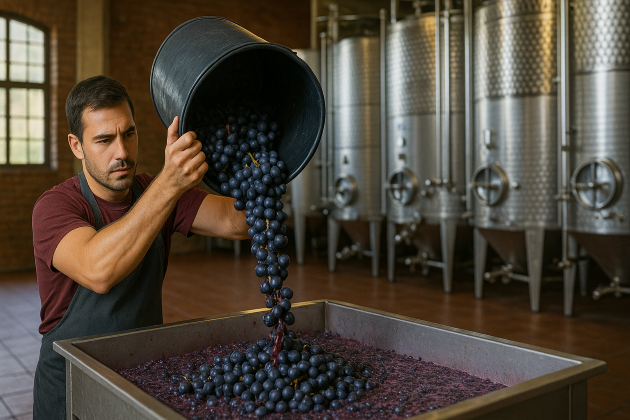Advertisements
Experience the countryside with daily agricultural employment and receive your reward the same day.

Daily agricultural employment in Italy represents a real alternative for those seeking immediate income and direct experiences linked to rural life.
This type of work provides contact with the land, interaction with different cultures, and the opportunity to learn about Italian agricultural traditions firsthand.
The simplicity of the format, combined with the possibility of rapid remuneration, makes daily agricultural employment a valued option in many regions.
Want to secure your spot and get paid daily working in the Italian countryside? Find out how to find agricultural daily employment opportunities.
Importance of the agricultural sector for the Italian economy.
Agricultural work in Italy is a historical pillar that sustains communities, drives exports, and guarantees the world-renowned quality of Italian products.
The agricultural sector not only produces food, it also strengthens small family farms, protects local traditions, and promotes tourism linked to rural culture.
With thousands of producers spread across different regions, agriculture creates jobs, supports the regional economy, and keeps Italian cultural identities alive.
Among the various employment modalities, daily agricultural employment stood out for offering immediate income, flexibility, and attracting local professionals seeking opportunities.
Main agricultural regions that hire daily workers.
Agricultural work in Italy is present in several regions, but some stand out for their strong tradition and high demand for labor.
In Tuscany, growing grapes for famous wines creates unique opportunities, especially during the harvest, when producers hire daily.
In Piedmont and Veneto, in addition to vineyards, there are various plantations that require constant labor, ideal for quick work.
In the south, Sicily and Puglia lead the way in daily agricultural employment, especially in orchards and fruit trees, guaranteeing immediate work.
Types of roles in the Italian agricultural sector.
Farm work in Italy encompasses a variety of roles that vary depending on the harvest, region, and demand, providing opportunities for both Italians and immigrants.
These roles range from simple, manual activities to tasks requiring more experience and specialization, ensuring room for different worker profiles.
Harvest and sowing.
Harvesting is one of the most in-demand jobs, involving fruits, vegetables, and grapes, and is often associated with daily agricultural employment opportunities.
Planting requires physical preparation and attention to detail, as it involves correctly positioning seeds and seedlings to ensure productivity and quality throughout the season.
During spring and summer, many Italian regions ramp up hiring for sowing, offering quick opportunities to those seeking immediate employment in the fields.
In autumn, the spotlight falls on the grape harvest, when thousands of people participate in the collection of grapes destined for renowned Italian wineries.
I work in greenhouses and orchards.
Italian greenhouses concentrate irrigation, fertilization, and temperature control tasks, which are essential for ensuring high-quality products year-round.
In the gardens, workers tend vegetables, pruning, harvesting, and organizing production, usually on seasonal or ongoing contracts.
These functions require attention and delicacy, as they handle sensitive products, often destined for local markets, trade fairs, or international exports.
Many employers offer short-term contracts in orchards, making these positions attractive to those seeking quick and easily accessible experience.
Warehouse and processing operations.
After the harvest, winery responsibilities include receiving products, cleaning tanks, and assisting with the fermentation process.
Workers also participate in sorting, sorting, and pressing, tasks essential to transforming agricultural production into products ready for consumption.
These activities are essential to maintaining the quality of wine, oil, and derivatives, requiring attention and commitment at every stage of the process.
Although less common as daily jobs, some wineries hire temporary reinforcements in the middle of the season, offering specific opportunities to workers.
Logistics and internal transport.
Rural logistics encompasses the movement of cargo, boxes, and sacks, as well as internal transportation of crops between fields and storage centers.
These positions are ideal for workers with experience working with agricultural machinery, tractors, or forklifts, and generally offer better pay for the responsibility assumed.
During peak production times, farmers hire temporary helpers to expedite transportation, ensuring rapid and efficient distribution of goods.
This sector remains dynamic because it depends on the pace of agricultural production and the need to quickly transport perishable foods to market.
Grounds and infrastructure maintenance.
Maintenance includes mowing lawns, repairing fences, cleaning irrigation systems, and general maintenance of productive land.
Although they may seem simple, these tasks are essential to maintaining agricultural infrastructure in good condition, ensuring safety and constant productivity.
Many farmers hire temporary workers for these tasks, offering temporary opportunities that help supplement workers' incomes.
This work continues throughout the year, but increases during periods of soil preparation and harvest.
Specialized functions.
Some roles require more experience, such as pest control, use of advanced machinery, quality analysis, and monitoring of new agricultural technologies.
These activities offer better salaries and recognition, aimed at those seeking professional growth within the agricultural sector.
In addition to practice, technical courses and training increase the chances of landing more qualified positions, which are highly valued in several Italian regions.
Daily agricultural employment also appears here, especially when urgent demands arise that require experienced professionals to resolve them.
How daily vacancies work in the agricultural sector.
Agricultural work in Italy offers various types of employment, allowing you to choose between seasonal, temporary, or even daily options.
These vacancies respond to specific needs in the field, varying according to the time of year, the crop, and the urgency of local producers.
Difference between seasonal, temporary and daily contracts.
Seasonal contracts are common during harvest times, lasting weeks or months, while temporary contracts cover shorter, more specific needs.
The daily contract, also known as a single-day contract, guarantees immediate remuneration and is popularly known as daily agricultural employment in various regions.
Many producers prefer temporary or seasonal contracts, but turn to the daily format when they face peak demand and need to reinforce their teams.
The choice depends on the crop, the season, and the availability of workers seeking greater or lesser stability.
What it means to be an Operaio Agricolo a Tiempo Determinado (OTD).
An OTD is an agricultural worker hired for a specific period, usually during harvests, with legal rights, contributions, and a regulated salary.
This format is widely used in Italy because it offers flexibility to both employers and those seeking short-term experience in the field.
The OTD can last from a few days to months, depending on the needs of the farm, winery, or responsible producer.
Although temporary, this contract guarantees benefits provided by law, such as formal registration, fair wages, and coverage for workplace accidents.
Prestazione occasionale: when the work can actually be done on a daily basis.
Occasional service is a modality created for specific services, allowing payment to be made proportionally per day.
In this format, you can work for one or a few days, ideal for those looking for flexibility, extra income, or quick experiences.
Despite its advantages, there are legal limits on hours and annual amounts, ensuring that it is used only in specific cases.
Many consider it a variation on daily agricultural employment, as it offers immediate payment and avoids long contractual commitments.
Remuneration for daily agricultural work.
Agricultural work in Italy offers a variety of payment methods, which vary by region, position, and type of contract.
For those seeking quick income, daily wages represent an immediate return, adapting well to the needs of seasonal workers.
Average values paid per day in the main regions.
In Tuscany, vineyard workers receive between €55 and €70 per day, especially during the grape harvest, when demand is highest.
In Piedmont, famous for its wineries, daily agricultural employment ranges from €60 to €75, depending on the job and the crop.
In Veneto, in addition to grapes, there are vacancies in orchards and greenhouses, with payments between €50 and €65 per day.
In the south, such as Sicily and Puglia, wages range between €45 and €60 per day, reflecting the productive diversity of these regions.
Difference between daily and hourly pay.
Daily pay ensures a fixed amount for the full shift, regardless of the exact hours worked, providing financial predictability.
Hourly pay offers flexibility, adjusting compensation to the actual time worked, and is common for specific or shorter assignments.
In several regions, producers use both formats, adapting to the nature of the agricultural task, whether long harvests or quick tasks.
Both models are valid; it is up to the worker to choose the one that best fits their stability or flexibility needs.
Factors influencing salary: region, function and qualification level.
Agricultural remuneration depends on location, as each province establishes specific tables, considering costs and production characteristics.
Simple tasks, such as manual harvesting, pay less, while specialized activities, such as operating tractors or quality control, command higher wages.
The level of qualifications also plays a role, taking into account previous experience, technical courses, or the ability to operate modern equipment.
These factors make daily agricultural employment a diverse opportunity, where each worker finds options based on their experience and income expectations.
Labor laws that regulate the agricultural sector.
Agricultural work in Italy is governed by regulations that protect both workers and employers, ensuring clear and fair relationships.
These laws establish minimum wages, pension rights, and safe working conditions, making agricultural activity more equitable and organized in the country.
The role of the CCNL Operai Agricoli e Florovivaisti.
The CCNL establishes the contractual bases, regulating wages, vacations, and working hours for agricultural workers, including those engaged in daily agricultural employment.
Each province adapts salary values according to its circumstances, balancing regional needs with the national standardization of labor rights.
In addition to setting salary scales, the CCNL regulates rest, holidays, nighttime bonuses, and protection during peak periods.
This collective agreement serves as a legal reference for employers and employees, providing security and predictability in the agricultural sector.
Guaranteed rights: INPS, INAIL and pension contributions.
The INPS (National Institute of Social Security) provides retirement and benefits, while the INAIL (National Institute of Social Security) provides protection in the event of an accident, covering medical assistance and compensation.
These contributions are mandatory and form part of the contract, even temporary ones, reinforcing the importance of regularization.
Complying with these obligations offers peace of mind to the worker, who receives minimum guarantees for his efforts in the field.
For workers, being registered means building a valid history, which is essential for the future and access to social benefits.
Risks of informal work and the problem of caporalato.
Informal work exposes people to exploitation, lack of security, and low wages, especially in regions with a high dependence on foreign labor.
Caporalato is an illegal system where intermediaries control hiring, exploiting immigrants and denying fundamental rights.
This model increases risks, reduces safety, and perpetuates inequalities, harming workers and the Italian agricultural sector.
Seeking legal vacancies, including daily agricultural employment, is essential to avoid exploitation and ensure decent working conditions.
How to find daily agricultural vacancies in Italy.
Agricultural work in Italy offers various channels for those seeking quick opportunities, including digital platforms that connect producers with available workers.
These tools simplify the search, ensure greater security, and help locate short-term vacancies in various regions.
Coldiretti Job in Country.
Place

Job in Country
The Coldiretti Job in Country platform is one of the most recognized, created to connect Italian farmers with workers seeking quick jobs.
The site offers options ranging from long-term contracts to daily agricultural employment, ideal for flexibility and immediate income.
The system is managed by one of Italy's leading agricultural organizations, providing trust and a solid foundation for transparent procurement.
It also offers informational support on legal requirements, necessary documents, and guidance to ensure compliant hiring.
AgriJobs.
Place

AgriJobs
AgriJobs is a specialized platform that publishes vacancies directly from rural employers, serving diverse profiles with short- or long-term opportunities.
The listings are updated frequently, allowing you to find positions in harvesting, greenhouses, logistics, or agricultural maintenance.
What sets it apart is the ability to filter by region, function, or contract type, making it easier to find specific opportunities.
Many employers use AgriJobs to post seasonal vacancies, creating a fast-track, secure hiring channel.
WineJob.
Place

WineJob
WineJob focuses on the wine sector, providing opportunities in Italian wineries for various roles related to cultivation and processing.
In addition to the grape harvest, it publishes administrative and commercial positions, offering a comprehensive view of the wine world.
The search is simple and organized, allowing you to find vacancies tailored to your profile, with clear information on salaries and requirements.
The portal also features daily agricultural job postings, ideal for those looking for short-term work during the grape harvest.
Practical tips for getting daily vacancies.
Farm work in Italy requires preparation and information to achieve good opportunities, especially for those seeking fair wages and security.
With a few simple guidelines, you can increase your chances of finding reliable vacancies, avoiding risks, and taking advantage of every opportunity.
How to negotiate compensation correctly.
Negotiating salary is essential to avoid surprises and ensure that what is agreed upon is actually fulfilled.
During interviews, ask about local averages and compare offers, keeping in mind that daily agricultural employment is usually paid on the spot.
It's important to agree on hours, breaks, and possible extras before starting, avoiding misunderstandings.
Transparency benefits both parties, generating trust and balanced contracts.
Importance of legal contracts and advance communication.
A formal contract protects the worker and ensures benefits such as pension contributions, insurance, and compliance with rights.
Advance notice is mandatory in Italy: the employer must register the employee at least one day before starting.
This prevents irregularities and combats informal work.
Always demand clear documentation, avoiding accepting conditions that compromise your safety or income.
Where to seek support: unions and workers' associations.
Agricultural unions provide guidance on rights and wages, as well as support in reporting abuses.
Associations offer courses, training, and publish legal and transparent vacancies.
They serve as support to resolve doubts and facilitate the integration of immigrants.
When searching for daily agricultural job openings, unionizing is a practical way to avoid risks and increase your chances.
Conclusion.
Concluding that daily agricultural employment is a viable alternative means recognizing its importance in generating immediate income and job inclusion in various regions.
This model offers flexibility, allowing different profiles to find space on the field.
Although challenges such as seasonality and informal work exist, formalization guarantees security, rights, and fair wages.
Interested? Discover another flexible option in the Italian market. Read the next article and learn all about Lavora a Chiamata in Italy.
Recommended Content
